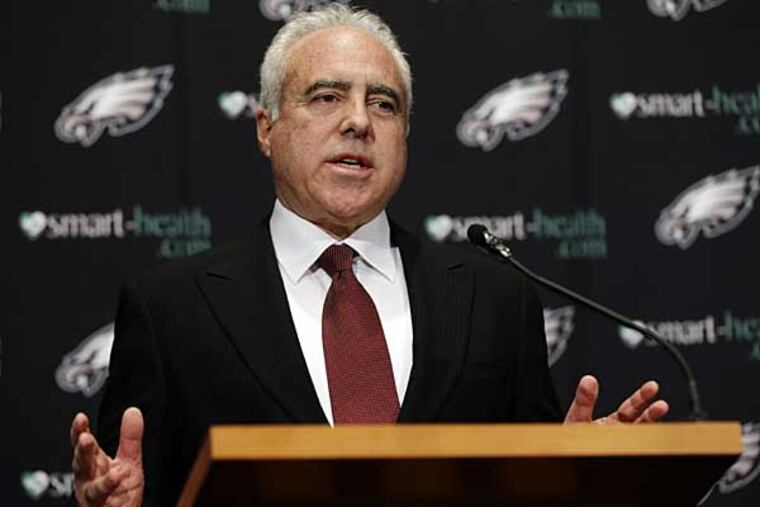No surefire way to pick the next Eagles coach
OK, QUICK: Who replaced Vince Lombardi when he left the Packers? Chuck Noll when he retired from the Steelers?

OK, QUICK: Who replaced Vince Lombardi when he left the Packers?
Chuck Noll when he retired from the Steelers?
Don Shula when he stepped down as Dolphins coach?
Tom Landry after he was fired? Marv Levy when he left the Bills?
Bill Walsh? Joe Gibbs? Marty Schottenheimer?
If you can answer even half of these, you are indeed a football fanatic worthy of a free Super Bowl ticket. Not that I have one to give, but if I did, you'd be at or near the top of my list.
It's an interesting list, filled with some notable hits and some grandiose misses. The question is, can we learn anything from it as the Eagles seek a replacement for their winningest-ever coach? Is there a common thread?
There seems to be only one. You have a better chance of succeeding not by hiring Bill Cowher, Jimmy Johnson or Jon Gruden, but by finding a younger version of each. You may recall that Andy Reid was a 41-year-old quarterbacks coach when the Eagles hired him in 1999. Cowher was 35 when he won 11 games as a rookie coach with Pittsburgh. Still only 40, current Pittsburgh coach Mike Tomlin was the youngest head coach to win a Super Bowl when the Steelers beat Arizona in 2009.
Jon Gruden led the Tampa Bay Buccaneers to their one Super Bowl championship at age 39. Shula was 33 when he succeeded Weeb Ewbank as the Colts' head coach in 1963. Heck, even Noll was only 37 when he took the Steelers job.
It's no sure bet, of course. Tomlin interviewed for the Miami job the same year he decided on Pittsburgh. The Dolphins turned to 46-year-old Cam Cameron, a wildly successful offensive coordinator who, to this day, owns one of the NFL's all-time best winning percentages at that job.
Cameron was 1-15 in his first and only season as a head coach. He was fired last month as the Ravens' offensive coordinator, despite the team's 9-4 record at the time.
The recent successes of Jim Harbaugh in San Francisco and Pete Carroll in Seattle apparently have catapulted two college coaches near or at the top of the Eagles wish list. A word of caution, though: Harbaugh spent time in the NFL as a player and Carroll was a head coach for two NFL teams before heading off to win two NCAA titles with Southern California. Neither Oregon's Chip Kelly nor Penn State's Bill O'Brien has pro head-coaching experience in his background, although O'Brien served on Bill Belichick's Patriots staff before taking the Penn State job.
Being an NFL assistant is no guarantee, of course. Longtime Steelers defensive guru Dick LeBeau was 12-33 in three seasons as the Bengals' head coach. Noted coordinators Wade Phillips and Dave Wannstedt have struggled in head-coaching stints. Charlie Weis, Steve Spagnuolo, Romeo Crennell - that list is, indeed, endless.
Another faulty assumption: No matter what the legacy, replacing one of these longtime head coaches is not a recipe for disaster. With college coach Jimmy Johnson replacing Landry as their head coach, the Cowboys won two Super Bowls within his first 5 years.
George Seifert won a Super Bowl in his first season as Walsh's replacement, won two overall, and won 10 or more games in each of his eight seasons as Niners head man. So often overlooked because of Walsh's impact on the game, Seifert was 98-30 with the Niners in the regular season and 10-5 in the postseason. In comparison, Walsh was 92-59 in the regular season and 10-4 in the postseason, while winning three Super Bowls over his 10 seasons as Niners coach. With the exception of the 1982 strike season, San Francisco won 10 or more games from 1981 through Seifert's final season in 1996.
In comparison, Noll won 10 games only once in the 12 seasons that followed his fourth Super Bowl title. He was replaced by Cowher, who had been an energetic 34-year-old defensive coordinator with Schottenheimer's Kansas City Chiefs. Cowher failed to win at least 10 games only once in his first six seasons, but did not win a Super Bowl until his 14th.
Seifert was Walsh's assistant. So was Mike Holmgren, who also served under Seifert before heading to Green Bay. Belichick was a Bill Parcells assistant, as was Tom Coughlin. Landry and Lombardi coached together on the New York Giants staff before carving their respective Hall of Fame busts.
But the college game has changed over the last decade, evidenced not only by the success of Carroll and Harbaugh, but also by the successes of rookie quarterbacks throughout the league this season.
"In college, I saw all the different coverages in the world," Eagles quarterback Nick Foles, who played against Carroll's and Harbaugh's Pac-12 teams, told me a couple weeks ago. "And everyone seems to have elaborate schemes."
So why not Chip Kelly? And if he gets away, why not O'Brien or Brian Kelly at Notre Dame? I'd even give Nick Saban, the Alabama coach who struggled as a head coach with the Dolphins, a second chance.
A second chance sure seems to have served Carroll well.